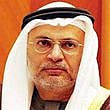We’re proud of the UAE’s military role in Yemen
Political solution, not force alone, will solve the Rubik’s Cube of conflicts


As the UAE draws down and redeploys its forces in Yemen, we do so in the same way we began — with eyes wide open. We understood the challenges then and we understand them today. There was no easy victory and there will be no easy peace.
But now is the time to double down on the political process. The Yemeni parties — Al Houthis specifically — should see this move for what it is: A confidence-building measure to create new momentum to end the conflict. The international community also must seize the moment. It must deter any side from exploiting or undermining this opportunity, stop Al Houthis from blocking aid, hasten compromise from all sides and support a determined United Nations-led mediation effort.
In the meantime, there will be no security vacuum. The government of Yemen’s military carried the greatest burden in taking back control of large parts of the country. These local units will remain in place under Yemeni command and with ongoing support from the coalition.
The UAE and the rest of coalition are not leaving Yemen. While we will operate differently, our military presence will remain. In accordance with international law, we will continue to advise and assist local Yemeni forces. We will respond to attacks against the coalition and against neighbouring states.Anwar Gargash, UAE minister of state for foreign affairs
In fact, it was these same local Yemeni forces that broke the Al Houthi stranglehold on Yemen. Supported by the coalition, they fought bravely and successfully to take back Aden, Yemen’s second largest city, along with much of the coastlines along the Red Sea and Arabian Sea. Their push on Hodeida with deliberately calibrated military pressure was decisive in persuading Al Houthis to re-engage in talks. The subsequent UN-facilitated Stockholm agreement and its implementation have been imperfect, but the de-escalation has saved lives, improved the humanitarian situation and provided a foothold for a broader political process.
The coalition’s intervention also accomplished other important objectives. Iran has been denied another strategic maritime chokehold in the region — freedom of navigation between Asia and the Mediterranean through the Bab Al Mandeb strait, the Red Sea and the Suez Canal has been protected. The world does not want to see the threat to global shipping in and around the Strait of Hormuz repeated on the other side of the Arabian Peninsula.
Without coalition intervention, Iran was also well on its way to replicating its destabilising and corrosive Lebanese Hezbollah model of proxy warfare in Yemen. Trained, equipped and encouraged by Iran, Al Houthis gained access to some of the most sophisticated arms ever employed by a non-state actor — weaponised drones, ballistic missiles and radio-controlled IEDs [improvised explosive devices]. Iran was prepared to take full advantage of Al Houthis’ total control of Yemen.
We have also effectively neutralised the threat from Al Qaida in the Arabian Peninsula (AQAP) — one of the terrorist group’s most dangerous franchises. Local Yemeni units, enabled and supported by the coalition, took down AQAP’s budding ‘caliphate’ in and around the port city of Mukalla. One western intelligence analyst hailed it as a “textbook solution of dealing with terrorist groups that hold territory”.
But just to be clear, the UAE and the rest of coalition are not leaving Yemen. While we will operate differently, our military presence will remain. In accordance with international law, we will continue to advise and assist local Yemeni forces. We will respond to attacks against the coalition and against neighbouring states. With international partners, we will stay vigilant in securing access to critical waterways. Having donated more than $5.5 billion (Dh20.22 billion) in aid to Yemen since 2015, our support for large-scale humanitarian assistance programmes, as well as UN and international organisations working in the country, will continue.
Also Read: Al Houthis have killed the Sweden deal
Martin Griffiths, the UN Special Envoy, told the Security Council last week that “we need to think now together of the realities and opportunities, which now define our chances of making a move on peace”.
The coalition’s latest moves improve these chances. Military force alone will never solve Yemen’s Rubik’s Cube of conflicts and constantly shifting alliances — but it has created the conditions for a reenergised peace process.
With eyes wide open, the world should take a closer look at what has changed in Yemen. The legitimate government regained control of large parts of the country. Living conditions are better in these areas. A political dialogue has restarted. AQAP is at its weakest point in years and Iranian aggression has been checked.
We are not blind to the price of this progress and the difficulties still ahead. For sure, the work of securing and repairing Yemen remains unfinished and a true peace for the Yemeni people is still unrealised. The promise of that goal, however, is now closer at hand than during four years of war. We hope the Houthis, too, have their eyes wide open to this critical opportunity.
Sign up for the Daily Briefing
Get the latest news and updates straight to your inbox



